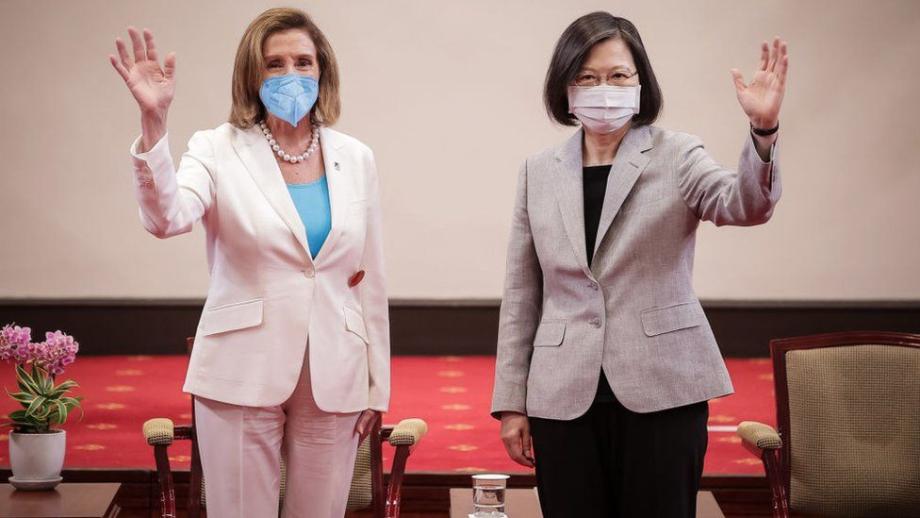Apple of Discord: How Nancy Pelosi’s Visit to Taiwan Buried Hopes for China’s Co-Mediation on Russia’s War in Ukraine

The world held its breath when two powerful nuclear states almost clutched their fists over Taiwan during the controversial visit of the US House Speaker Nancy Pelosi to the island. A collective sigh of relief occurred with the worst-case scenario being avoided. Notwithstanding that, the visit has severely deepened the cracks in shaky US-China relations, resulting in at least two gloomy complications. First, we should expect more rapprochement between China and Russia. Second, we should bury hopes for China to play a constructive role as an international co-mediator between Russia and Ukraine.
Fading prospects of positions’ alignment
Despite Western critics of China’s support of Russia in the war in Ukraine and attempts by the US, EU, NATO and G7 to make China more critically vocal about Russia’s military adventurism, the PRC has always preferred to hide itself under “constructive ambiguity” and to stick to diplomatic cliches of peaceful resolution through negotiations. In turn, Russia has been frustrated that China did not openly stand on the side of Russia and allegedly did not provide military assistance. This development comes as a bitter pill for the Kremlin as Russians seemingly hoped for this outcome on the basis of the aligned positions reflected in the February Joint Statement and the roadmap for military cooperation, signed in November 2021.
However in the diplomatic domain, to Russia’s delight China has been keeping the line to abstain or vote against UN resolutions condemning Russian aggression in Ukraine. China also managed to balance on a fence with regard to sanctions imposed on Russia, by disrupting some activities of Chinese companies in Russia, while increasing import of Russian fossil fuels. Notwithstanding that ambiguity, Western partners have not given up on their hopes to convince China to become more explicit in condemning Russia’s violation of international law. Despite the obvious challenges, they are demonstrating admirable perseverance to get to success. But their optimistic view to eventually get China on board becomes ever more conflicting with reality. Especially on the background of the recent political heat.
Nancy Pelosi’s visit to Taiwan, however brave, will force China to become more suspicious and incredulous regarding US actions. China’s conviction over selfish hegemonic ambitions of the US will only get firmer and make sentiments that US and NATO are solely responsible for the war in Ukraine more pronounced. China’s statements on “no limits friendship” with Russia will definitely get deeper meaning and forge their relations to a new level of strategic partnership.
Xi Jinping reassurances of China's support to Russia’s "sovereignty and security" made in June are highly likely to receive new heights. Russia has already rushed to seize the moment, by offering China its support in case of potential military conflict with the US over Taiwan. At the same time, the Russians have been very discreet to ensure there is a desirable quid pro quo.
No room for co-mediator’s role
Another issue, which have been occupying heads of many decision-makers, is about China’s possible engagement as a co-mediator in future meaningful talks between Russia and Ukraine. Ukrainian officials were first to raise the issue of possible China’s involvement to mediate a ceasefire. EU put it even more bluntly , calling for China to get involved. US officials have been expressing their views that China could use this opportunity and exert its influence over Russia to end the war and end the bloodshed.
These attempts have not been successful so far, as PRC’s leader even have not spoken to President Zelensky, despite Ukraine’s numerous hopes. China keeps reiterating its non-reference to the military conflict and insists that it has its own view how to contribute to peace. Chinese officials preferred neither committing to security guarantees, nor to directly offering themselves as mediators, despite the fact that as early as in March this year the State Councilor and Foreign Minister of PRC Wang Yi stated that “China is prepared to continue playing a constructive role to facilitate dialogue for peace and work alongside the international community when needed to carry out necessary mediation”. Around the same time some international experts made attempts to draw the international community closer to this idea.
Yet, track records of China’s involvement into international disputes shows its tradition to act rather as a dialogue facilitator, then an active broker. What we might have hoped for is only to see China exerting its diplomatic skills to ensure smooth communication, not to pressure any of the sides. Strikingly enough, in five months since the invasion China has not made any evident move to execute this role. It could be argued that this hesitancy has been caused mostly by a complexity of the nature of the conflict, which has been perceived in China predominantly as Western-caused and Western-driven. Therefore, in China’s view, it should be resolved by the West itself. Also, Russia’s imperial ambitions over an independent Ukraine resonate very much with China’s viewpoint on Taiwan. How could one big state with imperialistic mindset pursue another one with similar ambitions to step down and give up on territories it considers to be of its historic legitimacy?
Against that backdrop, the emotionally intense visit of the US House Speaker to Taiwan only accentuated existing concerns of China about US and has made it ever more reluctant to actively play to the Western tune. For now, China will only reinforce its own view on the war and will apply an opportunistic ambiguity approach to the West.
*The views expressed in this piece are of the author alone and do not necessarily represent the official position of GLOBSEC.
